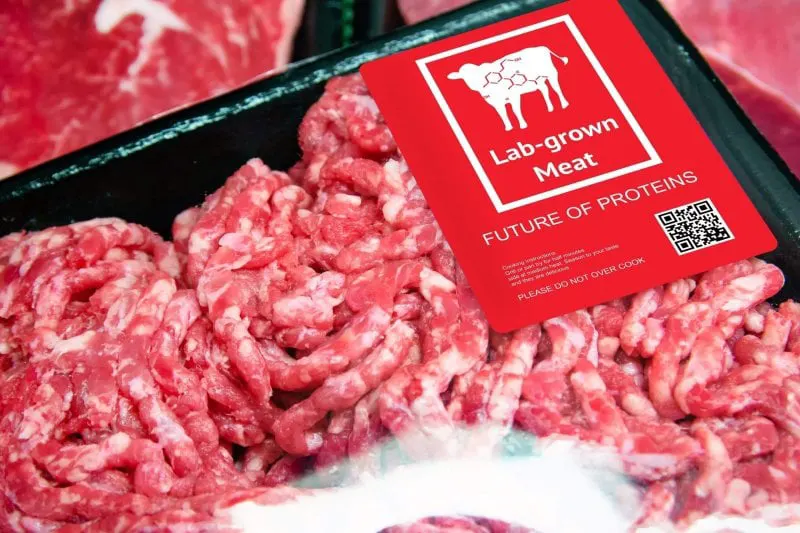Lab-grown meat requires fewer farm inputs than livestock, but more energy. Is it really better for the planet?
Lab-grown meat requires fewer farm inputs than livestock, but more energy. Is it really better for the planet?


Cultured meat doesn’t require grazing land or tons of feed. Instead it’s grown in bioreactors like those already used to produce pharmaceuticals and ethanol. A few animal cells are chosen for the type of meat desired, and placed on a biological scaffold to grow into the right shape and structure in a bioreactor that turbocharges cell growth from a speck to a serving.
A paper from Arizona State University, which is cited by both clean meat doubters and backers, suggests cultured meat “could require smaller quantities of agricultural inputs and land than livestock,” but at a potentially higher energy demand. The reason? It doesn’t use animals whose bodies provide temperature regulation, waste elimination and other functions that will have to be replaced by industrial equivalents. But the Good Food Institute, a leading connector of cultured meat innovators and investors, says that clean energy will develop alongside the cultured meat sector to “reduce the life cycle emissions of a clean meat facility by 40% to 80%.”
Even if substantial energy is needed to produce clean meat, there could still be large environmental rewards. A 2018 paper by Hanna Tuomisto of University of Helsinki calculates a potentially large reduction in greenhouse gases with cultured meat compared to raising cows and sheep for meat.
Read the original post

 | Videos | More... |

Video: Nuclear energy will destroy us? Global warming is an existential threat? Chemicals are massacring bees? Donate to the Green Industrial Complex!
 | Bees & Pollinators | More... |

GLP podcast: Science journalism is a mess. Here’s how to fix it

Mosquito massacre: Can we safely tackle malaria with a CRISPR gene drive?

Are we facing an ‘Insect Apocalypse’ caused by ‘intensive, industrial’ farming and agricultural chemicals? The media say yes; Science says ‘no’
 | Infographics | More... |

Infographic: Global regulatory and health research agencies on whether glyphosate causes cancer
 | GMO FAQs | More... |

Why is there controversy over GMO foods but not GMO drugs?

How are GMOs labeled around the world?

How does genetic engineering differ from conventional breeding?
 | GLP Profiles | More... |

Alex Jones: Right-wing conspiracy theorist stokes fear of GMOs, pesticides to sell ‘health supplements’




 Trust issues: What happens when therapists use ChatGPT?
Trust issues: What happens when therapists use ChatGPT? California, Washington, Oregon forge immunization alliance to safeguard vaccine access against federal undermining
California, Washington, Oregon forge immunization alliance to safeguard vaccine access against federal undermining Fighting deforestation with CO2: Biotechnology breakthrough creates sustainable palm oil alternative for cosmetics
Fighting deforestation with CO2: Biotechnology breakthrough creates sustainable palm oil alternative for cosmetics Viewpoint — Fact checking MAHA mythmakers: How wellness influencers and RFK, Jr. undermine American science and health
Viewpoint — Fact checking MAHA mythmakers: How wellness influencers and RFK, Jr. undermine American science and health 30-year-old tomato line shows genetic resistance to devastating virus
30-year-old tomato line shows genetic resistance to devastating virus The free-range chicken dilemma: Better for birds, but with substantial costs
The free-range chicken dilemma: Better for birds, but with substantial costs Viewpoint: Video — Big Solar is gobbling up productive agricultural land and hurting farmers yet providing little energy or sustainabilty gains
Viewpoint: Video — Big Solar is gobbling up productive agricultural land and hurting farmers yet providing little energy or sustainabilty gains ‘You have to treat the brain first’:Rethinking chronic pain with Sanjay Gupta
‘You have to treat the brain first’:Rethinking chronic pain with Sanjay Gupta
